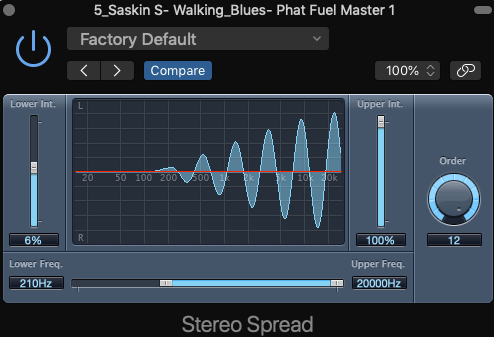
This controls how long the compressor stays on between attack and release. We still have ratio, attack and release, but we also have peak/RMS. You can change the crossover frequency depending on what is needed to affect a smaller or more comprehensive frequency range. Let’s say we want to compress just the low end to make it more consistent. The sweet spot is usually around 60-100Hz. To stop the compressor from overreacting to your bass, use the side chain in HP (high pass) mode, and adjust the frequency dial until the compressor is no longer reacting to your kick or other low-end instruments more than the rest of the mix. We hear bass frequencies as quieter than higher frequencies, but the compressor doesn’t.
MUST HAVE LOGIC PRO X PLUGINS MASTER PRO
Pro Tip: compressor’s ‘ears’ don’t work the same as ours. With this type of compression, you might have lost some loudness, so be sure to use your loudness meter to check, and adjust the make-up gain to make up for any loss. You can use this online calculator to find appropriate millisecond times for your release. The release will need to be timed to your song’s BPM to sound natural. Next, the attack should be short to medium to let some punchiness through, while the release should be long – somewhere above 100ms is a safe bet. Adjust until you are getting around a subtle 1dB of reduction. For glueing, we want the compression to affect most of the signal, so the threshold needs to be slightly lower.

This time, you might like to go for a higher knee. To set it up, follow the same steps as before. The Vintage VCA is Logic’s version of the SSL G Bus Compressor, best known for its beautiful saturation and ability to magically glue things together. Don’t be afraid to switch it off later if it isn’t serving the track. This type of compression is helpful in some cases, but in others can make the mix sound over-compressed. Try paying attention to your kick and snare (or other percussions) as they have the punchiest sound and will impact peaks the most. This could be anywhere around 30 to 100ms. The compressor needs to release quickly to catch just the peaks, but not so fast that it creates pumping.

We want it to be fast enough to catch the peaks but not so fast that it messes with bass frequencies. Next, start to increase your attack time. This means you are catching just the peaks and leaving the rest of the signal untouched. To start compressing, adjust the threshold until you get quick little spikes on the meter every now and then. Turn the attack and release all the way down, and set your ratio at around 2:1. This controls how obvious your compression will be (with 0 being the most obvious). Set the knee somewhere in the middle to start. This ensures you have enough headroom for mastering.įirst, turn off the auto release and gain to set up your compressor. First, check that your stereo out channel is not reaching above -3dB. Try not to repeat it more than twice – getting stuck in an endless cycle of tweaking is no fun.īefore exporting the mix, you must also make some quick technical checks. You might like to use different speakers or headphones this time.
MUST HAVE LOGIC PRO X PLUGINS MASTER HOW TO
Step 1: Is Your Track Ready for Mastering? How to Prepare



 0 kommentar(er)
0 kommentar(er)
